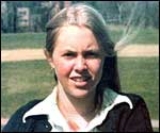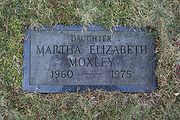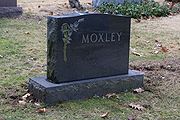
Martha Moxley
Encyclopedia

Murder
Murder is the unlawful killing, with malice aforethought, of another human being, and generally this state of mind distinguishes murder from other forms of unlawful homicide...
victim in a case that attracted worldwide publicity owing to a "Kennedy
Kennedy family
In the United States, the phrase Kennedy family commonly refers to the family descending from the marriage of the Irish-Americans Joseph P. Kennedy, Sr. and Rose Elizabeth Fitzgerald that was prominent in American politics and government. Their political involvement has revolved around the...
connection".
Moxley was born in San Francisco, California
California
California is a state located on the West Coast of the United States. It is by far the most populous U.S. state, and the third-largest by land area...
, to Dorthy and David Moxley and lived in Piedmont, California
Piedmont, California
Piedmont is a small, affluent city in Alameda County, California, United States. It is surrounded by the city of Oakland. The population was 10,667 at the 2010 census. Piedmont was incorporated in 1907 and was developed significantly in the 1920s and 1930s...
. Martha and her family settled in Belle Haven, an affluent section of Greenwich, Connecticut
Greenwich, Connecticut
Greenwich is a town in Fairfield County, Connecticut, United States. As of the 2010 census, the town had a total population of 61,171. It is home to many hedge funds and other financial service companies. Greenwich is the southernmost and westernmost municipality in Connecticut and is 38+ minutes ...
. Her circle of friends included neighbors Thomas and Michael Skakel
Michael Skakel
Michael C. Skakel was convicted in 2002 of the 1975 murder of Martha Moxley, his 15-year-old neighbor in Greenwich, Connecticut. He was sentenced to 20 years to life and remains incarcerated. Skakel is the nephew of Ethel Skakel Kennedy, the widow of Senator Robert F...
, nephews of Ethel Kennedy
Ethel Skakel Kennedy
Ethel Skakel Kennedy is the widow of Robert F. Kennedy, who served as Attorney General of the United States and a United States Senator for the state of New York.-Early life:...
.
Murder

The next day, Moxley's body was found underneath a tree in her family's backyard. Her trousers and underwear were pulled down, but she had not been sexually assaulted
Sexual assault
Sexual assault is an assault of a sexual nature on another person, or any sexual act committed without consent. Although sexual assaults most frequently are by a man on a woman, it may involve any combination of two or more men, women and children....
. Pieces of a broken six-iron golf club
Golf club (equipment)
A golf club is used to hit a golf ball in a game of golf. Each club is composed of a shaft with a grip and a clubhead. Woods are mainly used for long-distance fairway or tee shots; irons, the most versatile class, are used for a variety of shots; Hybrids that combine design elements of woods and...
were found near the body. An autopsy
Autopsy
An autopsy—also known as a post-mortem examination, necropsy , autopsia cadaverum, or obduction—is a highly specialized surgical procedure that consists of a thorough examination of a corpse to determine the cause and manner of death and to evaluate any disease or injury that may be present...
indicated she had been both bludgeoned and stabbed with the club, which was traced back to the Skakel home.
Initial investigation
Thomas Skakel was the last person known to have been seen with Moxley the night of the murder and had a weak alibiAlibi
Alibi is a 1929 American crime film directed by Roland West. The screenplay was written by West and C. Gardner Sullivan, who adapted the 1927 Broadway stage play, Nightstick, written by Elaine Sterne Carrington, J.C...
. Thomas Skakel became the prime suspect, but his father forbade access to his school and mental health records. Kenneth Littleton, who had started working as a live-in tutor for the Skakel family only hours before the murder, also became a prime suspect. No one was charged, however, and the case languished for decades. In the meantime, several books were published about the crime, including Timothy Dumas' A Wealth of Evil and the novel A Season in Purgatory
A Season in Purgatory
A Season in Purgatory is a 1993 novel by Dominick Dunne. It was inspired by the 1975 murder of Martha Moxley, for which Michael Skakel, the nephew of Ethel Skakel Kennedy, eventually was convicted...
by Dominick Dunne
Dominick Dunne
Dominick John Dunne was an American writer and investigative journalist, whose subjects frequently hinged on the ways in which high society interacts with the judicial system...
, a fictional account of the case.
Over the years, both Thomas and Michael Skakel significantly changed their alibis for the night of Moxley's murder. Michael Skakel claimed that he had been window-peeping and masturbating in a tree beside the Moxley property from 11:30 p.m. to 12:30 a.m. Two former students of a drug rehab center that Michael Skakel attended in 1978 testified that they heard Skakel confess to killing Moxley with a golf club. According to then Elan resident Gregory Coleman, Skakel then bragged, "I'm going to get away with murder. I'm a Kennedy."
Investigation re-opened
When William Kennedy SmithWilliam Kennedy Smith
William Kennedy Smith is an American physician whose work focuses on landmines and the rehabilitation of people disabled by them....
was tried for rape
Rape
Rape is a type of sexual assault usually involving sexual intercourse, which is initiated by one or more persons against another person without that person's consent. The act may be carried out by physical force, coercion, abuse of authority or with a person who is incapable of valid consent. The...
in 1991, a rumor surfaced that he had been present at the Skakel house on the night of the Moxley murder, with the clear insinuation that he might have been involved. Although this rumor proved to be unfounded, it resulted in renewed investigation of the then cold case. In 1993 author Dominick Dunne
Dominick Dunne
Dominick John Dunne was an American writer and investigative journalist, whose subjects frequently hinged on the ways in which high society interacts with the judicial system...
, father of murdered actress Dominique Dunne
Dominique Dunne
Dominique Ellen Dunne was an American actress.Dunne made appearances in several made for television movies, television series, and films, and played a supporting role as the oldest daughter, Dana Freeling, in the 1982 film Poltergeist...
, published A Season in Purgatory
A Season in Purgatory
A Season in Purgatory is a 1993 novel by Dominick Dunne. It was inspired by the 1975 murder of Martha Moxley, for which Michael Skakel, the nephew of Ethel Skakel Kennedy, eventually was convicted...
, a fictional story closely resembling the Moxley case. Mark Fuhrman
Mark Fuhrman
Mark Fuhrman is a former detective of the Los Angeles Police Department , known for his part in the investigation of the murders of Nicole Brown Simpson and Ronald Goldman and his subsequent felony conviction for perjury...
's 1998 book Murder in Greenwich named Michael Skakel as the murderer and pointed out numerous mistakes the police had made in investigating the crime. During the years before the Dunne and Fuhrman books, work had been done by Greenwich Police detectives Steve Carroll and Frank Garr and police reporter Leonard Levitt that named Michael Skakel as the killer.
Trial
In June 1998, a rarely invoked one-man grand juryGrand jury
A grand jury is a type of jury that determines whether a criminal indictment will issue. Currently, only the United States retains grand juries, although some other common law jurisdictions formerly employed them, and most other jurisdictions employ some other type of preliminary hearing...
was convened, and after 18 months (in June 2000) Michael Skakel was indicted
Indictment
An indictment , in the common-law legal system, is a formal accusation that a person has committed a crime. In jurisdictions that maintain the concept of felonies, the serious criminal offence is a felony; jurisdictions that lack the concept of felonies often use that of an indictable offence—an...
for the murder of Martha Moxley. In a highly publicized trial, Skakel was convicted for the murder of Martha Moxley on June 7, 2002, and received a sentence of 20 years to life in prison. Skakel's alibi was that at the time of the murder he was at his cousin's house. During the trial the jury heard part of a taped book proposal, which included Skakel speaking about masturbating in a tree on the night of the murder—the same tree under which Martha Moxley's body was found the next morning. Skakel never admitted to killing Moxley. Prosecutors took words from this proposal and overlaid them on graphic images of Moxley's dead body in a computerized, multi-media presentation shown to jurors during closing arguments. In the audiotape, Skakel said that when he was awoken the next morning, he was afraid he might have been seen the previous night "jerking off", and he felt panicked. The prosecutor deleted the portion of the audiotape where Skakel said "jerking off", giving the impression that he was confessing to the murder. When journalist Leslie Stahl confronted the prosecutor about his presentation, the prosecutor said it had been completely appropriate.
The prosecutors' use of the multimedia presentation during closing arguments was included in Skakel's initial appeal
Appeal
An appeal is a petition for review of a case that has been decided by a court of law. The petition is made to a higher court for the purpose of overturning the lower court's decision....
and the judge ruled, "The state engaged in appropriate and effective advocacy by using trial exhibits to highlight certain evidence and inferences.... Just as the state should not be deprived of its most valuable evidence unless there is a compelling reason to do so, the state should not be prohibited from making its best arguments. The state's use of audio and photographic exhibits during argument was a matter of effective advocacy. The state did not, as defendant claims, distort the evidence in any respect. By placing certain exhibits next to defendant's words, or by displaying two related exhibits simultaneously, the state was making explicit the inferences it was asking the jury to draw. This is the job of an advocate...."
Post-trial
In January 2003, attorney Robert F. Kennedy, Jr.Robert F. Kennedy, Jr.
Robert Francis Kennedy, Jr. is an American radio host, activist, and attorney specializing in environmental law. He is the third of eleven children born to Ethel Skakel Kennedy and Robert F. Kennedy and is the nephew of John F. Kennedy and Edward M. Kennedy...
, Skakel's cousin, wrote a controversial article in The Atlantic Monthly
The Atlantic Monthly
The Atlantic is an American magazine founded in Boston, Massachusetts, in 1857. It was created as a literary and cultural commentary magazine. It quickly achieved a national reputation, which it held for more than a century. It was important for recognizing and publishing new writers and poets,...
entitled "A Miscarriage of Justice," insisting that Skakel's indictment "was triggered by an inflamed media, and that an innocent man is now in prison". Kennedy's article presents the argument that there is more evidence suggesting that Kenneth Littleton, the Skakel family's live-in tutor, killed Moxley. He also calls Dominick Dunne the "driving force" behind Skakel's prosecution.
Appeal and post-conviction proceedings
Skakel continued to fight his conviction. In November 2003, Skakel appealed to the Connecticut Supreme CourtConnecticut Supreme Court
The Connecticut Supreme Court, formerly known as the Connecticut Supreme Court of Errors, is the highest court in the U.S. state of Connecticut. It consists of a Chief Justice and six Associate Justices. The seven justices sit in Hartford, across the street from the Connecticut State Capitol...
, arguing that the trial court erred because the case should have been heard in Juvenile Court
Juvenile court
A juvenile court is a tribunal having special authority to try and pass judgments for crimes committed by children or adolescents who have not attained the age of majority...
rather than Superior Court, that the statute of limitations
Statute of limitations
A statute of limitations is an enactment in a common law legal system that sets the maximum time after an event that legal proceedings based on that event may be initiated...
had expired on the charges against him, and that there was prosecutorial misconduct
Prosecutorial misconduct
In jurisprudence, prosecutorial misconduct is a procedural defense; via which, a defendant may argue that they should not be held criminally liable for actions which may have broken the law, because the prosecution acted in an "inappropriate" or "unfair" manner. Such arguments may involve...
. On January 12, 2006, however, the Connecticut Supreme Court rejected Skakel's claims and affirmed his conviction. Subsequently, Skakel retained attorney and former United States Solicitor General
United States Solicitor General
The United States Solicitor General is the person appointed to represent the federal government of the United States before the Supreme Court of the United States. The current Solicitor General, Donald B. Verrilli, Jr. was confirmed by the United States Senate on June 6, 2011 and sworn in on June...
Theodore Olson
Theodore Olson
Theodore Bevry Olson is a former United States Solicitor General, serving from June 2001 to July 2004 under President George W. Bush.- Early life :...
, who on July 12, 2006, filed a petition for a writ of certiorari
Certiorari
Certiorari is a type of writ seeking judicial review, recognized in U.S., Roman, English, Philippine, and other law. Certiorari is the present passive infinitive of the Latin certiorare...
on behalf of Skakel before the Supreme Court of the United States
Supreme Court of the United States
The Supreme Court of the United States is the highest court in the United States. It has ultimate appellate jurisdiction over all state and federal courts, and original jurisdiction over a small range of cases...
. On November 13, 2006, the Supreme Court declined to hear the case.
Since then, Skakel has begun his first round of postconviction proceedings, beginning with a petition for writ of habeas corpus
Habeas corpus
is a writ, or legal action, through which a prisoner can be released from unlawful detention. The remedy can be sought by the prisoner or by another person coming to his aid. Habeas corpus originated in the English legal system, but it is now available in many nations...
and motion for new trial in the Connecticut trial court which originally heard his case. Skakel's cousin Robert F. Kennedy, Jr.
Robert F. Kennedy, Jr.
Robert Francis Kennedy, Jr. is an American radio host, activist, and attorney specializing in environmental law. He is the third of eleven children born to Ethel Skakel Kennedy and Robert F. Kennedy and is the nephew of John F. Kennedy and Edward M. Kennedy...
has brought forth Gitano "Tony" Bryant, cousin of Los Angeles Lakers
Los Angeles Lakers
The Los Angeles Lakers are an American professional basketball team based in Los Angeles, California. They play in the Pacific Division of the Western Conference in the National Basketball Association...
player Kobe Bryant
Kobe Bryant
Kobe Bean Bryant is an American professional basketball player who plays shooting guard for the Los Angeles Lakers of the National Basketball Association . Bryant enjoyed a successful high school basketball career at Lower Merion High School, where he was recognized as the top high school...
and a former classmate of Skakel at the private Brunswick School in Greenwich, Connecticut. In a videotaped interview with Skakel private investigator Vito Colucci in August 2003, Bryant said one of his companions the night of Moxley's murder wanted to "go caveman" on her, meaning violently have his way with her. Bryant says he never came forward before because his mother warned him, and he believed her, that as a black man he would be tagged for the unsolved murder. A two-week hearing in April 2007 allowed the presentation of this hearsay evidence, among other matters. In September 2007, Skakel's attorneys filed a petition, based in part on Bryant's claims, asking for a new trial; prosecutors formally responded that Bryant may have made up the story to sell a play about the case.
The new Skakel defense team also hired a full-time investigative team to review existing and new information—particularly a book written about Élan School
Elan School
Élan School was a private, coeducational, controversial residential behavior modification program and therapeutic boarding school in Poland, Androscoggin County, Maine...
—in preparation for the hearing. They argued that no Élan School residents with Skakel, other than Gregory Coleman, ever spoke about Skakel's confession to anyone, including the author of the book.
On October 25, 2007, a Superior Court judge denied the request for a new trial, saying Bryant's testimony was not credible and there was no evidence of prosecutorial misconduct in the original trial. Skakel's lawyer indicated she would appeal this decision.
External links
- Crime Library: The Martha Moxley Murder
- MarthaMoxley.com website of a friend and former classmate
- Exclusive: Ghosts Of Greenwich from CBS NewsCBS NewsCBS News is the news division of American television and radio network CBS. The current chairman is Jeff Fager who is also the executive producer of 60 Minutes, while the current president of CBS News is David Rhodes. CBS News' flagship program is the CBS Evening News, hosted by the network's main...
September 10, 2003 - Complete Skakel trial coverage from Court TV
- R.Kennedy involvement
- "Miscarriage of Justice" by Robert F. Kennedy Jr.
- Sutton Report

